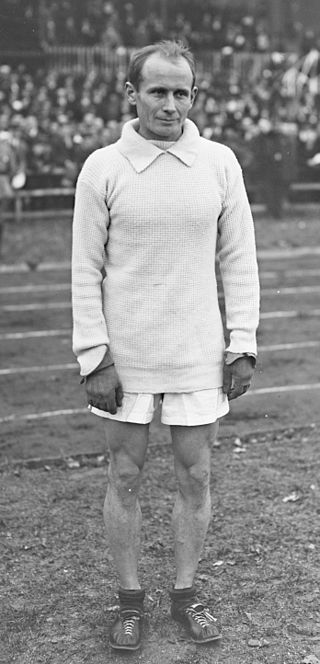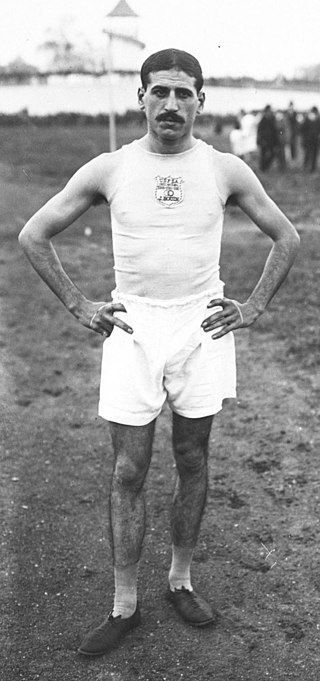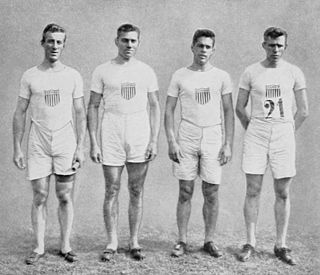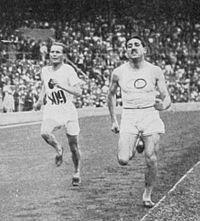
Juho Pietari "Hannes" Kolehmainen was a Finnish four-time Olympic gold medalist and a world record holder in middle- and long-distance running. He was the first in a generation of great Finnish long-distance runners, often named the "Flying Finns". Kolehmainen competed for a number of years in the United States, wearing the Winged Fist of the Irish American Athletic Club. He also enlisted in the 14th Regiment of the National Guard of New York, and became a U.S. citizen in 1921.

France competed at the 1912 Summer Olympics in Stockholm, Sweden. 119 competitors, 118 men and 1 woman, took part in 66 events in 13 sports.

Alexandre François Étienne Jean Bouin was a French middle-distance runner. He competed in the 1500m at the 1908 Olympics and the 5000m at the 1912 Olympics. He won a silver medal in the 5000m in 1912, behind Hannes Kolehmainen. His race against Kolehmainen has long been regarded as one of the most memorable moments in running. Kolehmainen and Bouin quickly pulled away from the others, with Bouin leading and Kolehmainen repeatedly trying to pass him. Kolehmainen succeeded only 20 metres from the finish, winning by 0.1 seconds. Both contenders broke the previous world record.

The men's 100 metres was a track and field athletics event held as part of the Athletics at the 1912 Summer Olympics programme. It was the fifth appearance of the event, which is one of 12 athletics events to have been held at every Summer Olympics. The competition was held on 6 July 1912 and on 7 July 1912. Seventy runners from 22 nations competed. NOCs could enter up to 12 athletes. The event was won by Ralph Craig of the United States, as the Americans swept the medals for a second time.

The men's 200 metres was a track and field athletics event held as part of the Athletics at the 1912 Summer Olympics programme. It was the fourth appearance of the event, which has appeared at every edition of the Summer Olympics since the 1900 Summer Olympics. The competition was held on July 10, 1912, and on July 11, 1912. 61 runners from 19 nations competed. NOCs could enter up to 12 athletes. The event was won by Ralph Craig of the United States, the nation's third victory in four Games. Another American, Donald Lippincott, took silver. Great Britain earned its first medal in the 200 metres with Willie Applegarth's bronze.

The men's 400 metres was a track and field athletics event held as part of the Athletics at the 1912 Summer Olympics programme. The competition was held on Friday, July 12, 1912, and on Saturday, July 13, 1912. Forty-nine runners from 16 nations competed. NOCs could enter up to 12 athletes. The event was won by Charles Reidpath of the United States, the nation's fourth title in the event. Hanns Braun of Germany took silver, the nation's first medal in the men's 400 metres.

The men's 800 metres was a track and field athletics event held as part of the athletics at the 1912 Summer Olympics programme. It was the fifth appearance of the event, which is one of 12 athletics events to have been held at every Summer Olympics. The competition was held from Saturday, July 6, 1912, to Monday, July 8, 1912. Forty-seven runners from 16 nations competed. NOCs could enter up to 12 athletes. The event was won by Ted Meredith of the United States, the nation's third consecutive victory in the 800 metres. Mel Sheppard became the first man to win two medals in the event, coming in second to miss out on defending his 1908 gold. Ira Davenport completed the United States sweep, the second time the Americans had swept the 800 metres podium.

The men's 1500 metres was a track and field athletics event held as part of the athletics at the 1912 Summer Olympics programme. The competition was held on Tuesday, July 9, 1912, and on Wednesday, July 10, 1912. Forty-five runners from 14 nations competed, including the Olympic champion from 1908, Mel Sheppard. NOCs could enter up to 12 athletes.

Finland competed at the 1912 Summer Olympics in Stockholm, Sweden. The Grand Duchy of Finland was an autonomous part of the Russian Empire at the time, which allowed Finland to compete separately of Russia Russia at the 1908 Summer Olympics due to Finland's special status. During the opening ceremony, Finland's team paraded under the national insignia flag of a Swedish-speaking female gymnastics club in Helsinki. 164 competitors, 162 men and 2 women, took part in 49 events in 10 sports.

The men's 10,000 metres was a track and field athletics event held as part of the Athletics at the 1912 Summer Olympics programme. It was the debut of the event, which along with the 5000 metres replaced the 5 mile race held at the 1908 Summer Olympics. The competition was held on Sunday, July 7, 1912, and on Monday, July 8, 1912. Thirty runners from 13 nations competed. NOCs could enter up to 12 athletes.

The men's 110 metres hurdles was a track and field athletics event held as part of the Athletics at the 1912 Summer Olympics programme. The competition was held on Thursday, July 11, 1912, and on Friday, July 12, 1912. 22 hurdlers from 10 nations competed. NOCs could enter up to 12 athletes. The event was won by Fred Kelly of the United States, the fifth of five consecutive victories for the nation in the first five Olympic Games. It was also the fourth of four consecutive podium sweeps for the Americans in the event.

The men's 4 × 100 meters relay was a track and field athletics event held as part of the Athletics at the 1912 Summer Olympics program. It was the debut of the event, which along with the 4 × 400-meter relays marked the first relays of equal legs in the athletics program. The competition was held on Monday, July 8, 1912, and on Tuesday, July 9, 1912. NOCs could enter 1 team of 4 athletes, with up to 2 reserves.

The men's 4 × 400 metres relay was a track and field athletics event held as part of the Athletics at the 1912 Summer Olympics programme. It was the debut of the event, which along with the 4 × 100 metre relay marked the first relays of equal legs in the athletics programme. The competition was held on Sunday, July 14, 1912, and on Monday, July 15, 1912. Twenty-eight runners from seven nations competed. NOCs could enter 1 team of 4 athletes, with up to 2 reserves.

The men's 3000 metres team race was a track and field athletics event held as part of the athletics at the 1912 Summer Olympics programme. It was the fourth appearance of a team race style event, though the first to be held at the distance of 3000 metres, which became the standard until the event was eliminated following the 1924 Summer Olympics. The competition was held on Friday, July 12, 1912, and on Saturday, July 13, 1912.

The men's coxed fours with inriggers, also referred to as the coxed four with jugriggers, was a rowing event held as part of the Rowing at the 1912 Summer Olympics programme. It was the only appearance of the restricted event. The competition was held on Wednesday and Thursday, 17 and 18 July 1912. Thirty rowers from four nations competed.
The men's 1500 metre freestyle was a swimming event held as part of the swimming at the 1912 Summer Olympics programme. It was the second appearance of the event, which had been introduced in 1908. At the 1904 and 1906 Olympics a one-mile freestyle contest was held. The competition was held from Saturday July 6, 1912 to Wednesday July 10, 1912.
The men's 100 metre backstroke was a swimming event held as part of the swimming at the 1912 Summer Olympics programme. It was the second appearance of the event, which had been introduced in 1908. In 1904 a 100-yard event was held. The competition was held from Tuesday July 9, 1912 to Saturday July 13, 1912.
The men's 5000 metres event was part of the track and field athletics programme at the 1920 Summer Olympics. The competition was held on Monday, August 16, 1920, and on Tuesday, August 17, 1920. Thirty-eight runners from 16 nations competed.

The men's marathon event was part of the track and field athletics programme at the 1920 Summer Olympics. The distance of this race was 42.75 kilometres. The competition was held on Sunday, 22 August 1920. 48 runners from 17 nations competed. No nation had more than 4 runners, suggesting the limit had been reduced from the 12 maximum in force in 1908 and 1912. The event was won by Hannes Kolehmainen of Finland, the nation's first Olympic marathon medal and victory; Kolehmainen received his fourth gold medal, having won the 5000 metres, 10,000 metres, and individual cross country in 1912. Estonia and Italy also won their first marathon medals.
The men's 1500 metres event was part of the track and field athletics programme at the 1924 Summer Olympics. The competition was held on Wednesday, July 9, 1924, and on Thursday, July 10, 1924. As for all other races the track was 500 metres in circumference. Forty middle distance runners from 22 nations competed. The maximum number of athletes per nation was 4.


















